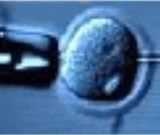
Human cloning
Overview
Human cloning is the creation of a genetically identical copy of a human. It does not usually refer to monozygotic multiple birth
s nor the reproduction of human cells
or tissue
. The ethics of cloning is an extremely controversial issue. The term is generally used to refer to artificial human cloning; human clones in the form of identical twins
are commonplace, with their cloning occurring during the natural process of reproduction.
There are two commonly discussed types of human cloning: therapeutic cloning and reproductive cloning.
Multiple birth
A multiple birth occurs when more than one fetus is carried to term in a single pregnancy. Different names for multiple births are used, depending on the number of offspring. Common multiples are two and three, known as twins and triplets...
s nor the reproduction of human cells
Cell (biology)
The cell is the basic structural and functional unit of all known living organisms. It is the smallest unit of life that is classified as a living thing, and is often called the building block of life. The Alberts text discusses how the "cellular building blocks" move to shape developing embryos....
or tissue
Tissue (biology)
Tissue is a cellular organizational level intermediate between cells and a complete organism. A tissue is an ensemble of cells, not necessarily identical, but from the same origin, that together carry out a specific function. These are called tissues because of their identical functioning...
. The ethics of cloning is an extremely controversial issue. The term is generally used to refer to artificial human cloning; human clones in the form of identical twins
TWINS
Two Wide-Angle Imaging Neutral-Atom Spectrometers are a pair of NASA instruments aboard two United States National Reconnaissance Office satellites in Molniya orbits. TWINS was designed to provide stereo images of the Earth's ring current. The first instrument, TWINS-1, was launched aboard USA-184...
are commonplace, with their cloning occurring during the natural process of reproduction.
There are two commonly discussed types of human cloning: therapeutic cloning and reproductive cloning.
Unanswered Questions

